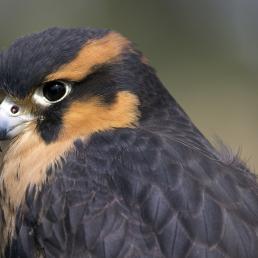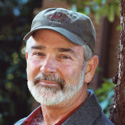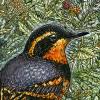

Join BirdNote tomorrow, November 30th!
Illustrator David Sibley and actor H. Jon Benjamin will face off in the bird illustration battle of the century during BirdNote's Year-end Celebration and Auction!
Herman Melville, author of Moby Dick, described the Galápagos, a group of volcanic islands in the Pacific, as: "an archipelago of aridities, without inhabitant, history, or hope of either in all time to come." Charles Darwin also found the Galápagos' stark landscape on first view hellish to behold. But it was the unique life forms on this remote collection of islands -- massive tortoises, otherworldly iguanas, and some remarkable finches, like this Cactus Finch -- that helped Darwin develop his theory of evolution by natural selection. And recent scientific work on Darwin's finches shows more conclusively than any other research that evolution is dynamic, ongoing, and undeniable.
BirdNote®
Galápagos Archipelago - Melville's Encantadas
Evolution in the Enchanted Archipelago
Written by Bob Sundstrom
This is BirdNote.
[Wind and ocean waves]
“Take five-and-twenty heaps of cinders dumped here and there in an outside city lot. Imagine some of them magnified into mountains, and the vacant lot the sea, and you will have a fit idea of the general aspect of the Encantadas, or Enchanted Isles.”
[Wind and ocean waves]
Herman Melville, author of Moby Dick, wrote these words about a group of volcanic islands in the Pacific. His tales of the islands – part travelogue, part darkly imagined parable – depict, in his words, “an archipelago of aridities, without inhabitant, history, or hope of either in all time to come.”
[Wind and ocean waves]
Today, we know these islands by another name: the Galápagos, the very same archipelago that Charles Darwin made famous. Like Melville, Darwin found the Galápagos’ stark volcanic landscape on first view hellish to behold. But it was the unique life forms on this remote collection of islands – massive tortoises, otherworldly iguanas, and some remarkable finches – that helped Darwin develop his theory of evolution by natural selection. [Large Cactus Finch]
And recent scientific work on Darwin’s finches in this “archipelago of aridities” shows more conclusively than any other research that evolution is dynamic, ongoing, and undeniable.
For BirdNote, I’m Michael Stein.
[Wind, ocean waves]
###
Sounds of provided by The Macaulay Library of Natural Sounds at the Cornell Lab of Ornithology, Ithaca, New York. Large Cactus Finch [85998] recorded by R. Bowman.
Producer: John Kessler
Executive Producer: Chris Peterson
© 2012 Tune In to Nature.org May 2012/2020 Narrator: Michael Stein
ID# archipelago-02-2012-05-17
[Seabird voices not used, but would be found there: Red-billed Tropicbirds or Waved Albatross]





